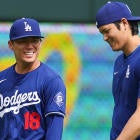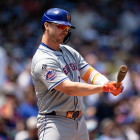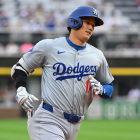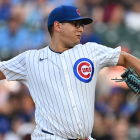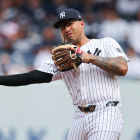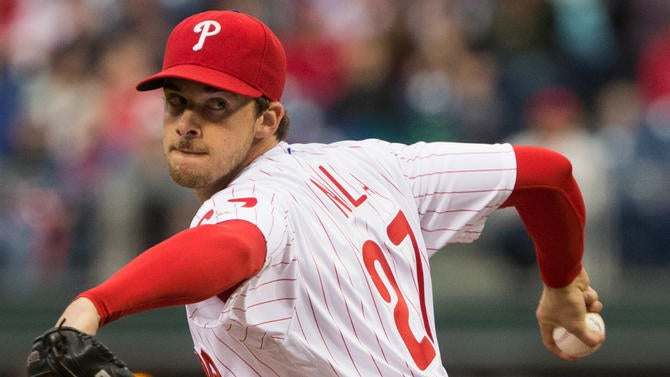
It looked like the streak was going to end. The Phillies had won four straight one-run games, with those four wins all coming in their past six games. For the season, the team's one-run record stood at 13-3, the best showing in baseball by a mile.
Now, David Hernandez threatened to give it all away. The Phillies' third option to close games, Hernandez was forced to take the ball Saturday against the Reds precisely because of all those one-run wins, all of which had been nailed down by the one-two combination of Hector Neris and Jeanmar Gomez. With both those successful right-handers unavailable, the Phillies watched as Hernandez put the first three batters on in the ninth. A Tucker Barnhart groundout still left the team in an uncomfortable spot: runners on second and third, one out, and Philly clinging to a precarious 4-3 lead.
Jordan Pacheco cracked a flyball to left, seemingly deep enough to score Eugenio Suarez. Anything short of an absolutely perfect throw, and an absolutely perfect tag, would tie the game and curtail the Phillies' magical run in close games. Tyler Goeddel got a leaning start, squeezed the ball in his glove, and came up firing. The ball traced a perfect arc, heading straight for Cameron Rupp's waiting mitt. Though new rules prevent catchers from blocking the plate, any throw that carries the catcher into the path of a baserunner may be caught as is. This meant that Suarez and the ball were about to arrive almost simultaneously, and that Rupp was about to get blown up.
The ball smacked into Rupp's mitt. Suarez hurled his body into the 6-foot-2, 260-pound catcher's mug, and...
No words. Just watch.https://t.co/IBxv4CyNur
— Phillies (@Phillies) May 15, 2016
Game over. Phillies win. Again.
Even with two straight losses since that indelible moment, this season has gone better than any Phillies fan, player, or decision maker could have possibly imagined. The Phils sit tight for second place, just a half a game behind the front-running Nationals. They've complemented their 14-3 record in one-run games with a flawless 4-0 mark in extra-inning contests. When Rupp hung onto the ball at the end of that thrilling collision, it marked the first time Philadelphia stood at seven games or more over .500 since ... the last day of the 2011 season, when they won their 102th game, closing out the winningest campaign in franchise history. Considering the Phils posted the worst record in baseball at 63-99 last season, we can safely call them the biggest surprise of 2016.
How you define the Phillies' success this season depends on how charitable you want to be.
The optimist's version points to impressive performances by several young pitchers to start the season. Vince Velasquez heads up that honor roll. The right-hander broke into the majors in a swingman role last year, flashing swing-and-miss stuff by striking out more than a batter an inning, but also struggling with command. Peaking at no. 86 on MLB.com's top prospects list last year, he was considered a decent starting pitching prospect who could settle into the back of a major-league rotation, maybe a no. 3 job if everything broke right. When the Phillies acquired him in an off-season trade with the Astros for Ken Giles and minor leaguer Jonathan Arauz, the thought was that Philly could make out well by virtue of acquiring five young players in one deal -- but not necessarily any future stars.
Velasquez has blown by expectations, and then some. In eight starts, he's tossed 48 1/3 innings, whiffed 59 batters, walked 15, and allowed just 33 hits and three home runs. His 2.42 ERA and 2.46 Fielding Independent Pitching mark both rank in the top 10 among NL starters. Velasquez isn't that mysterious a pitcher, firing his fastball nearly two-thirds of the time. It's just that no one can hit that mid-90s offering, making him a giant pain in the ass to face ... and a potential source of regret for the Astros for the next decade.
By multiple metrics, Velasquez's wingman Aaron Nola has been even better. Nola trails only Clayton Kershaw among NL FIP leaders, thanks to this deadly combination: a 28.6 percent strikeout rate, 4.4 percent walk rate, and gaudy 56 percent groundball rate. The seventh-overall pick in the 2014 draft, Nola has been considered the organization's best pitching prospect for a while now. Still, his sinker-curve combination has given hitters nightmares this season, with the curve in particular vying for the honor of the nastiest pitch thrown by any starter in the majors. When a pitcher can throw a breaking ball one-third of the time and limit opponents to an .084 batting average(!!!) against it, you know it's lethal. Then you watch the thing move and want to flee in terror.
As dominant as those two starters have been, though, the Phillies have leaned on two unlikelier heroes to crush opponents' hearts late in games. Jeanmar Gomez's reputation coming into this season was that of a decent but unspectacular relief pitcher, calling the Phillies his third major-league team and approaching journeyman status. He won the closer job by default coming out of spring training, thanks to multiple teammates' injuries, and a broader indifference from a rebuilding team to invest real money in a ninth-inning guy. Gomez has run with that default closer status, piling up 15 saves in 16 chances.

At least non-Phillies fans might've possibly heard of Gomez before this year. Hector Neris was one of baseball's most anonymous relief pitchers coming into this year, having never claimed a high-profile job, and falling victim in the majors to the same gopherball problem that frequently plagued him in the minors. He's allowed three long balls in 24 innings this year too, a rate that's higher than you'd like from a setup man, but still well below last season's rate of 1.8 homers per nine innings. The better news is that Neris has been nearly unhittable this year: He's punched out 33 batters in 24 innings, allowing a ludicrously low 10 hits in that stretch. If he gets two strikes on you and throws his splitter ... you're dead.
The success of Gomez and Neris has placed manager Pete Mackanin in a curious position. Like the rest of the world, he couldn't have had high expectations for this year's team, and had to figure his team would be frequently pitching from behind. The result is that Gomez and Neris are getting run through the ringer. The major league lead for reliever appearances is 23; Neris has 22, Gomez 21. If the Phillies keep playing this many tight games, two things are likely to happen: Phillies fans are going to run out of fingernails to chew off, and Neris and Gomez might see their arms fall off.
Here's where the uncharitable take comes in: There's almost no chance that any of those appendages come off anyone's body, because the Phillies' offense is horrible. They're averaging a scant 3.3 runs per game, ahead of only the Braves ... who are so bad, they just fired their manager. By run differential, they've been the seventh-worst team in the majors, allowing 30 more runs than they've scored.
A move here or there at the trade deadline wouldn't likely fix the problem either. If you were making a shopping list of needed lineup upgrades, at a minimum you'd need to address first base, second base, left field, and right field -- and that's assuming 37-year-old catcher Carlos Ruiz keeps dipping into the fountain of youth, and top shortstop prospect J.P. Crawford is ready for the majors some time soon (he's hitting .250 and slugging .355 at Double-A). Even if the pundits might've been excessively pessimistic about Philly's chances to start the year, there was a good reason for that pessimism: enough lineup holes to drive a semi-truck straight through.
But hey, nothing's impossible, right? Here's how we concoct the dream scenario. Odubel Herrera keeps hitting like peak Joe Mauer. Maikel Franco's bat heats up. Crawford gets the call and pulls off a Francisco Lindor-level rookie season. The pitching keeps blazing. And the 2012 Orioles, who won 93 games and stormed to the playoffs out of nowhere thanks to the best one-run record in major league history (29-9) get outdone by even luckier/grittier/whatever adjective you'd like to use Phillies club, one that's been better than you think for more than 100 games now.
Do we believe in miracles? Probably not! But this will be fun to watch, for as long as it lasts.











